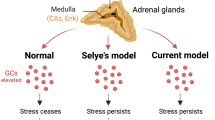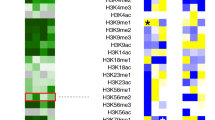Abstract
Acute traumatic stress may lead to post-traumatic stress disorder (PTSD)1, which is characterized by delayed neuropsychiatric symptoms including depression, irritability, and impaired cognitive performance2. Curiously, inhibitors of the acetylcholine-hydrolysing enzyme acetylcholinesterase may induce psychopathologies that are reminiscent of PTSD3,4. It is unknown how a single stressful event mediates long-term neuronal plasticity. Moreover, no mechanism has been proposed to explain the convergent neuropsychological outcomes of stress and of acetylcholinesterase inhibition. However, acute stress elicits a transient increase in the amounts released of the neurotransmitter acetylcholine and a phase of enhanced neuronal excitability5. Inhibitors of acetylcholinesterase also promote enhanced electrical brain activity6, presumably by increasing the survival of acetylcholine at the synapse. Here we report that there is similar bidirectional modulation of genes that regulate acetylcholine availability after stress and blockade of acetylcholinesterase. These calcium-dependent changes in gene expression coincide with phases of rapid enhancement and delayed depression of neuronal excitability. Both of these phases are mediated by muscarinic acetylcholine receptors. Our results suggest a model in which robust cholinergic stimulation triggers rapid induction of the gene encoding the transcription factor c-Fos. This protein then mediates selective regulatory effects on the long-lasting activities of genes involved in acetylcholine metabolism.
This is a preview of subscription content, access via your institution
Access options
Subscribe to this journal
Receive 51 print issues and online access
$199.00 per year
only $3.90 per issue
Buy this article
- Purchase on Springer Link
- Instant access to full article PDF
Prices may be subject to local taxes which are calculated during checkout





Similar content being viewed by others

References
Sapolsky, R. M. Why stress is bad for your brain. Science 273, 749–750 (1996).
Gurvits, T. V. et al. Neurological status of Vietnam veterans with chronic posttraumatic stress disorder. J. Neuropsych. Clin. Neurosci. 5, 183–188 (1993).
Rosenstock, L., Keifer, M., Daniell, W. E., McConnell, R. & Claypoole, K. Chronic central nervous system effects of acute organophosphate pesticide intoxication. Lancet 338, 223–227 (1991).
Wickelgr, I. The big easy serves up a feast to visiting neuroscientists: rat model for Gulf War Syndrome? Science 278, 1404 (1998).
Imperato, A., Puglisi-Allegra, S., Casolini, P. & Angellucci, L. Changes in brain dopamine and acetylcholine release during and following stress are independent of the pituitary-adrenocortical axis. Brain Res. 538, 111–117 (1991).
Ennis, M. & Shipley, M. T. Tonic activation of locus coeruleus neurons by systemic or intracoerulear microinjection of an irreversible acetylcholinesterase inhibitor: increased discharge rate and induction of c-fos. Exp. Neurol. 118, 164–177 (1992).
Friedman, A. et al. Pyridostigmine brain penetration under stress enhances neuronal excitability and induces early immediate transcriptional response. Nature Med. 2, 1382–1385 (1996).
Ben Aziz-Aloya, R. et al. Expression of a human acetylcholinesterase promoter-reporter construct in developing neuromuscular junctions of Xenopus embryos. Proc. Natl Acad. Sci. USA 90, 2471–2475 (1993).
Li, Y., Camp, S., Rachinsky, T. L., Bongiorno, C. & Taylor, P. Promoter elements and transcriptional control of the mouse acetylcholinesterase gene. J. Biol. Chem. 268, 3563–3572 (1993).
Bausero, P. et al. Identification and analysis of the human choline acetyltransferase gene promoter. Neuroreport 4, 287–290 (1993).
Cervini, R. et al. Specific vesicular acetylcholine transporter promoters lie within the first intron of the rat choline acetyltransferase gene. J. Biol. Chem. 270, 2465–2467 (1995).
Cole, A. E. & Nicoll, R. A. Acetylcholine mediates a slow synaptic potential in hippocampal pyramidal cells. Science 221, 1299–1301 (1983).
Ghosh, A., Ginty, D. D., Bading, H. & Greenberg, M. E. Calcium regulation of gene expression in neuronal cells. J. Neurobiol. 25, 294–303 (1994).
Seidman, S. et al. Synaptic and epidermal accumulations of human acetylcholinesterase is encoded by alternative 3′-terminal exons. Mol. Cell. Biol. 15, 2993–3002 (1995).
Karpel, R. et al. Expression of three alternative acetylcholinesterase messenger RNAs in human tumor cell lines of different tissue origins. Exp. Cell Res. 210, 268–277 (1994).
Layer, P. G. & Willbold, E. Novel functions of cholinesterases in development, physiology and disease. Prog. Histochem. Cytochem. 29, 1–99 (1995).
Koenigsberger, C., Chiappa, S. & Brimijoin, S. Neurite differentiation is modulated in neuroblastoma cells engineered for altered acetylcholinesterase expression. J. Neurochem. 69, 1389–1397 (1997).
Sternfeld, M. et al. Acetylcholinesterase enhances neurite growth and synapse development through alternate contributions of its hydrolytic capacity, core protein and variable C-termini. J. Neurosci. 18, 1240–1249 (1998).
Ichtchenko, K., Nguyen, T. & Sudhof, T. C. Structures, alternative splicing, and neurexin binding of multiple neuroligins. J. Biol. Chem. 271, 2676–2682 (1996).
Beeri, R. et al. Transgenic expression of human acetylcholinesterase induces progressive cognitive deterioration in mice. Curr. Biol. 5, 1063–1071 (1995).
1. Andres, C. et al. ACHE transgenic mice display embryonic modulations in spinal cord CHAT and neurexin Iβ gene expression followed by late-onset neuromotor deterioration. Proc. Natl Acad. Sci. USA 94, 8173–8178 (1997).
Beeri, R. et al. Enhanced hemicholinium binding and attenuated dendrite branching in cognitively impaired ACHE-transgenic mice. J. Neurochem. 69, 2441–2451 (1997).
Knapp, M. J. et al. A30-week randomized controlled trial of high-dose tacrine in patients with Alzheimer's disease. J. Am. Med. Assoc. 271, 985–991 (1994).
Winker, M. A. Tacrine for Alzheimer's disease: which patient, what dose? J. Am. Med. Assoc. 271, 1023–1024 (1994).
Sharabi, Y. et al. Survey of symptoms following intake of pyridostigmine during the Persian gulf war. Isr. J. Med. Sci. 27, 656–658 (1991).
Milner, I. B. & Axelrod, B. N., Pasquantonio, J. & Sillanpaa, M. Is there a Gulf War syndrome? J. Am. Med. Assoc. 271, 661 (1994).
Friedman, A. & Gutnick, M. J. Intracellular calcium and control of burst generation in neurons of guinea-pig neocortex in vitro. Eur. J. Neurosci. 1, 374–381 (1989).
Acknowledgements
We thank M. J. Gutnick for inspiration and discussion, and M. Sternfeld for recombinant cholinesterase variants. This research was supported by grants from the US Army Medical Research and Development Command, the Israel Science Fund, the USA–Israel Binational Science Foundation, the Israeli Health Ministry and Ester/Medica Neuroscience (to H.S.). A.F. was a post-doctoral fellow of the Smith Psychobiology Fund and an incumbent of the Teva research prize for young investigators.
Author information
Authors and Affiliations
Corresponding author
Rights and permissions
About this article
Cite this article
Kaufer, D., Friedman, A., Seidman, S. et al. Acute stress facilitates long-lasting changes in cholinergic gene expression. Nature 393, 373–377 (1998). https://doi.org/10.1038/30741
Received:
Accepted:
Issue Date:
DOI: https://doi.org/10.1038/30741
This article is cited by
-
The ACE genes in Aphelenchoides besseyi isolates and their expression correlation to the fenamiphos treatment
Scientific Reports (2022)
-
Risk of chlorine dioxide as emerging contaminant during SARS-CoV-2 pandemic: enzyme, cardiac, and behavior effects on amphibian tadpoles
Toxicology and Environmental Health Sciences (2022)
-
Rivastigmine Reverses the Decrease in Synapsin and Memory Caused by Homocysteine: Is There Relation to Inflammation?
Molecular Neurobiology (2022)
-
Inhibitory Effects of Selenium on Arsenic-Induced Anxiety-/Depression-Like Behavior and Memory Impairment
Biological Trace Element Research (2022)
-
Inhibitory neurotransmission drives endocannabinoid degradation to promote memory consolidation
Nature Communications (2020)
Comments
By submitting a comment you agree to abide by our Terms and Community Guidelines. If you find something abusive or that does not comply with our terms or guidelines please flag it as inappropriate.


